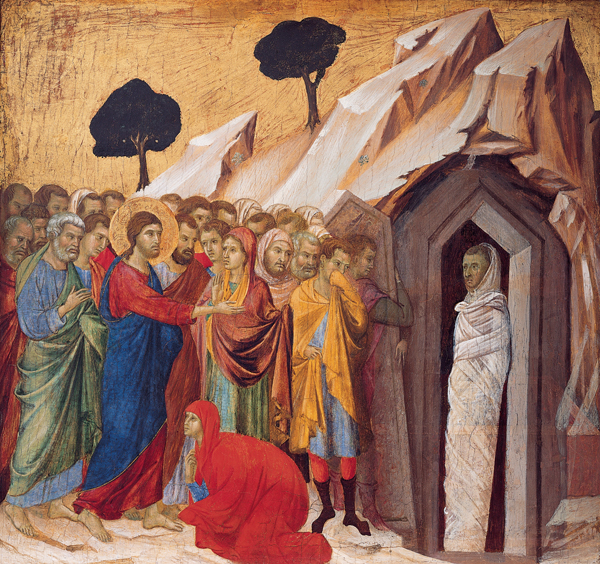 There continue to be liberal Christians, and even non-Christians, who really like the moral teachings of Jesus (e.g., “Love your neighbor”), but who set aside the accounts of his miracles (e.g., raising Lazarus from the dead). They chalk them up to legend or they insist that the miracles were not what his ministry was about. In their mind, a serious Bible student can ignore the miracle accounts in the Gospels and just focus on the Sermon on the Mount or Jesus’s other ethical discourses.
There continue to be liberal Christians, and even non-Christians, who really like the moral teachings of Jesus (e.g., “Love your neighbor”), but who set aside the accounts of his miracles (e.g., raising Lazarus from the dead). They chalk them up to legend or they insist that the miracles were not what his ministry was about. In their mind, a serious Bible student can ignore the miracle accounts in the Gospels and just focus on the Sermon on the Mount or Jesus’s other ethical discourses.
But are you a serious Bible student if you ignore the miracle accounts? Are the wonders Jesus performed peripheral to his mission, a sideshow that can be carved out?
Setting aside the issue of whether you believe miracles can occur, there is absolutely no doubt that Jesus and the people who witnessed his ministry thought that they could and did occur. Craig Keener, in his book Miracles: The Credibility of the New Testament Accounts (2 Volume Set), teaches us that a modern person simply cannot ignore this part of the Jesus traditions.
Although limited in kind (i.e., no artifacts), the available evidence for Jesus as a miracle worker is substantial. Although the evidence is limited concerning most particular miracles, all of the many ancient sources that comment on the issue agree that Jesus and his early followers performed miracles: Q, Mark, special material in Matthew and Luke, John, Acts, the Epistles, Revelation, and non-Christian testimony from both Jewish and pagan sources. . . .
Most scholars today working on the subject thus accept the claim that Jesus was a healer and exorcist. The evidence is stronger for this claim than for most other specific historical claims that we could make about Jesus or earliest Christianity. Scholars often note that miracles characterized Jesus’s historical activity no less than his teaching and prophetic activities did. So central are miracle reports to the Gospels that one could remove them only if one regarded the Gospels as preserving barely any genuine information about Jesus. Indeed, it is estimated that more than 31 percent of the verses in Mark’s Gospel involve miracles in some way, or some 40 percent of his narrative! Very few critics would deny the presence of any miracles in the earliest material about Jesus. (emphasis added)
Where is the consensus of historical scholarship on the issue of miracles in Jesus’s ministry?
It is thus not surprising that most scholars publishing historical research about Jesus today grant that Jesus was a miracle worker, regardless of their varying philosophic assumptions about divine activity in miracle claims. For example, E. P. Sanders regards it as an “almost indisputable” historical fact that “Jesus was a Galilean who preached and healed.” Using traditional historical-critical tools, John Meier finds many of Jesus’s reported miracles authentic. Raymond Brown notes that “scholars have come to realize that one cannot dismiss Jesus’s miracles simply on modern rationalist grounds, for the oldest traditions show him as a healer.” Otto Betz regards it as “certain” that Jesus was a healer, arguing “even from the Jewish polemic which called him a sorcerer.” The miracles, he notes, are central to the Gospels, and without them, most of the other data in the Gospels are inexplicable. Even Morton Smith, among the recent scholars most skeptical toward the Gospel tradition, argues that miracle working is the most authentic part of the Jesus tradition, though he explains it along the magical lines urged by Jesus’s early detractors.
Keener continues:
These observations do not resolve the question of individual miracle stories in the Gospels, but they do challenge one basic assumption that has often lodged the burden of proof against them: against some traditional assumptions, one cannot dismiss particular stories on the basis that Jesus did not perform miracles. One need not, therefore, attribute stories about Jesus’s miracles purely to legendary accretions. Nor should one expect that the church’s later Christology led them to invent many accounts of Jesus’s miracles; it may have influenced their interpretation and shaping of the accounts, but there was little reason to invent miracles for christological reasons. We lack substantial contemporary evidence that Jewish people expected a miracle-working messiah, and nonmessianic figures like Paul were also believed to be miracle workers (2 Cor 12: 12). Rather than Christology causing miracle claims to be invented, claims already circulating about Jesus’s miracles, once combined with other claims about Jesus, undoubtedly contributed to apologetic for a higher Christology. (emphasis added)
Where does this evidence leave us? It would seem that the miracles Jesus performed were an integral part of his ministry. The hope that historical Jesus can be separated from the wonders he performed is a lost cause. It’s really a package deal. Jesus loved his neighbors not by talking to them about good morals, but by miraculously healing them.